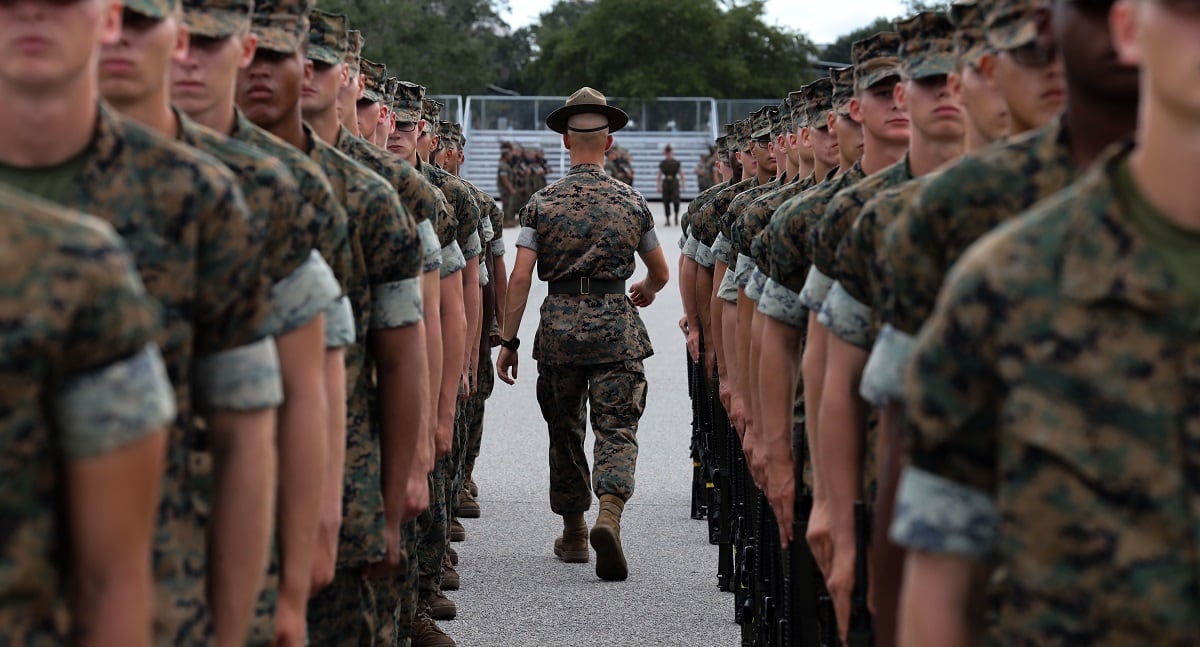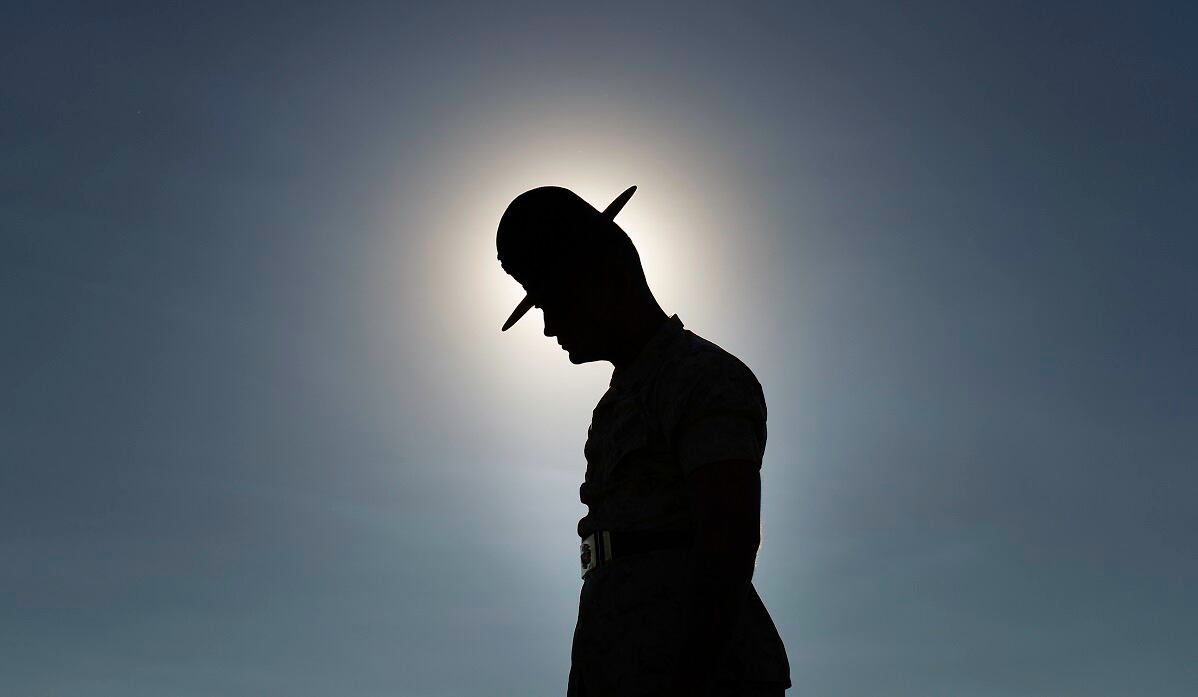The Marine Corps has received the findings of a detailed independent study on gender-integration at boot camp.
But Marine leaders say the service may not be able to implement one of the study’s top recommendations: making sure every recruit is trained by both male and female drill instructors.
Completed by the University of Pittsburgh under a $2 million contract, the 739-page study report covers a two-year period in which investigators interviewed DIs and recruits, observed training at both Marine Corps recruit depots and gathered physiological data on performance, sleep and stress through wearable devices and saliva samples.
The study compared results from three main groups: a series track, which included female recruit companies training alongside male companies; an integrated company, made up of two female recruit platoons and four male platoons in a single unit; and a male-only company.
RELATED

The Marine Corps commissioned the study in 2020 after Congress passed language in the annual defense budget bill requiring the service to fully integrate boot camp at Marine Corps Recruit Depot Parris Island, South Carolina, within five years, and at Recruit Depot San Diego within eight years.
The only military service that still operates gender-separated training at the platoon level, the Corps maintains that this approach is crucial to the “alchemy” of breaking recruits down and building them back up as highly trained and high-performing Marines.
Skeptics say gender segregation in training furthers harmful stereotypes and seeds a sexist mindset that troops take with them into the fleet.
Obtained exclusively by Marine Corps Times under a public records request, the study makes 18 recommendations.
While leaders of Marine Corps Training and Education Command say they’ve already made 12 of the recommended changes on their own initiative since the study began, the recommendation regarding integrated drill instructor teams still gives them pause.
The model recommended by the University of Pittsburgh story would keep same-gender drill instructor teams with male and female platoons only for hygiene, sleeping and overnight duty ― in keeping with the Marine Corps’ practice of maintaining drill instructor supervision of recruits around the clock.
Outside of the squad bay, however, all training would be conducted by mixed drill instructor teams, even if the Marine Corps maintains its current practice of organizing recruits in single-gender platoons.
“The Marine Corps posits ‘having strong leaders of both genders as role models for young recruits is integral to their assimilation into our ranks’ yet recruits’ primary training experiences are currently executed by same-gender drill instructor teams,” the report states. “Receiving direct, sustained training from drill instructors of both genders reinforces for recruits the concept that men and women are equally respected and authoritative leaders of their Service.”
It adds that drill instructors in mixed-gender teams also can offer recruits a tangible example of how to work effectively in an integrated environment in the fleet.
The Marine Corps, the only service that doesn’t use the integrated team model, styles its drill instructors, particularly senior drill instructors, as parental figures who model what it means to be a Marine and ― more than that ― demonstrate to teenage recruits how to be a man or a woman.
“Females [drill instructors] can do just as well, but I personally don’t think I could train how good of a man to be as I am now as male DIs can show me. … I came here to be a better man and wouldn’t be able to get that from a female,” a newly graduated male Marine told investigators, according to the study. “I think females [recruits] would have the same response.”
But other interviews revealed the ugly side effects this approach can have.
A full section of the study report was devoted to sexist language, and references to violence against women, used by male drill instructors with their male recruits in an effort to develop rapport.
Female drill instructors also are sometimes treated as lesser than their male peers, trainers reported: One male drill instructor described seeing a female chief drill instructor, in charge of an entire recruit series, being ignored on the parade deck as drill instructors asked for guidance from a male colleague.
A female training cadre member also described a meeting in which a senior recruit training regiment leader at Marine Corps Recruit Depot San Diego had told her that she was needed because “Men, when left to their own devices, revert back to their animalistic instincts.”
She told him she found the idea insulting. Investigators called this an example of the unhealthy “group think” that can develop in single-gender leadership teams.
For their part, recruits described being yelled at by drill instructors for looking at or speaking to recruits of the opposite gender, and developing an “us-versus-them” mentality in competitions with opposite-gender platoons that led to othering and disparagement.
Even efforts from female drill instructors to prepare their female recruits for the realities of life in the fleet could create unhealthy stigmas likely to make future work alongside male Marines more difficult.
“Female new Marines consistently expressed concern about experiencing sexual harassment and sexual assault in the fleet,” the report found. “Women reported receiving frequent and persistent messaging from drill instructors and others about the challenges they may face with unwanted sexual remarks or advances from male Marines. Ensuring female recruits are cognizant of the dangers of sexual violence is important, but a careful balance between awareness and fear or inevitability needs to be struck.”
Lt. Gen. Kevin Iiams, commander of TECOM, leads the recently formed “Entry-Level Training Advisory Council” including representatives from Recruiting Command, Manpower and Reserve Affairs and Installations and Logistics, which is now considering the ramifications of the drill instructor teams recommendation.
A major concern, he said, is manpower.
The Marine Corps, which until 2019 trained all female recruits in a single segregated battalion at Parris Island, South Carolina, will need to increase its female drill instructor population by 54% to meet congressional mandates, according to the University of Pittsburgh study.
Since the Marine Corps started integrating training companies at Parris Island, South Carolina, and adding female recruits for the first time at San Diego, female drill instructors told investigators they face burnout due to heightened workload and less recovery time between training cycles.
This is compounded, according to the study, by the ever-present pressure to excel and the perception that they “must outperform their male peers to earn the same respect.”
Col. Howard “Chip” Hall, TECOM’s chief of staff, added that a forced rapid expansion of the female drill instructor population would reduce the number of women in other prestige special-duty billets such as embassy security guard and combat instructor, and likely have negative side effects for retention and career progression.
Iiams said whatever option the Marine Corps selects has to provide the same experience for every recruit who comes through boot camp.
“I’m a one-standard kind of individual,” he said. “I don’t want to have mixed DI teams for only portions of the recruit population … it’s got to be everyone.”
While Iiams said unresolved manpower challenges are the major concern regarding integrated drill instructor teams, he remains protective of longstanding Marine Corps training methods and changes that would jeopardize their effect.
“There is a special alchemy that happens with our drill instructors inside the barracks, at the platoon level, that is stripping away the elements of an individual and instilling our core values,” he said.
“A drill instructor [goes] from an authoritarian figure into a teacher and into a mentor, to develop that trust model that will be sustained across your career where, ‘OK, I get it, we’re different. Now, because of what the Marine Corps has done to us, we’re better versions of ourselves than when we came in.’”
Hope Hodge Seck is an award-winning investigative and enterprise reporter covering the U.S. military and national defense. The former managing editor of Military.com, her work has also appeared in the Washington Post, Politico Magazine, USA Today and Popular Mechanics.





